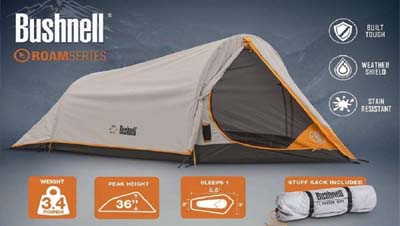One Person Tent? Also, there are many reasons for what you should get a one person tent and just like that there are many things that you should keep an eye out for before getting a one person tent. This article is going to show one person tent you reasons for getting a one person tent over other models and also it’s going to make you aware of the things or features to look for while getting one.
Why choose a one person tent over others?
There are many reasons that make better over two or four-person tents. Here is a list of them.
• First of all, it’s which makes it ideal for the people who prioritize their privacy over anything else. Say, if you are going to go on an adventure or on a long hike with your friends or with a group (also, group of strangers including) then some of you might want to spend the night alone and for them, a one-person tent is enough.
• It can house only you and your backpack and sometimes that’s what all you need. If you need space, you have the whole environment around you and for the sake of spending the night in a comfortable safe space, a one-person tent is enough.
• The biggest benefit that you are going to get out of a one-person tent is its being extremely lightweight. This is why if you are a bit selfish and don’t wanna carry a load of other’s shelter on your shoulder then a one person tent is the thing you are looking for.
• They also take a smaller space that’s really good for you if you want to travel light.
• For extreme hikers and climbers that can sometimes be the only solution.
• Well, many more reasons like these can be shown that will go in favor of your buying.
What to look for in a one person tent?
Now that you have finally decided to get a one person tent, it’s time for you to specifically know the things that you need to look for in a one person tent. The following sections might be appropriate for any kind of backpacking tent but we will shun out the extras just to keep things around one person tent.
A lot of things about your tent depend on its Seasonality. Before you get your tent you should know when are you going to use it mostly or in which area? There are some questions to ask like,
• When do you usually go on your adventures?
• Is it in summer or winter?
• Is there a possibility of rain or snow?
• How much wind is your tent going to face?
• What is the expected temperature?
Depending on the answers to these questions you should select your tent. There are tents that can only be suitable for the summer, there are tents that can protect you from rain, some can hold snow and there are some ultra durable ones that can take the pressure of the heavy wind.
Just like that, there are some 3 season tents and some models even offer up to 4 seasons. Here is the thing; all these types have their own advantages and disadvantages. The tent giving you protection from all the weather condition is like the jack of all trades but they can’t give you their hundred percent on every season.
That’s why they may not be that much comfortable. Also, the ones designed to withstand furious wind will use more poles making the whole pack heavy and hard to carry around in your backpack. If your sole purpose is to go on hardcore adventures then your backpacking tent must be lightweight & portable.
The material and the number of poles have everything to do with its weight. The single tents are generally lightweight but there are some models that pack excellent quality materials that weightless. The whole thing is a two-way street actually.
You would surely want your tent to be strong and enough to protect you from any unexpected situations in the middle of the night but that’s gonna take away its being lightweight feature. If you want both of these features that will require NASA grade technology where the price would have certainly skyrocketed.
You should also put an emphasis on the construction and design of the tent as there are many things that are gonna depend on it. You don’t want to spend the whole day assembling your tent, do you? Just like that, you shouldn’t get a tent that will loosely anchor to the ground and topple you over if a strong wind blows.
The material and the metals in your tent is really important. We have seen issues with these things in a lot of tents. The metals can break, the fabrics gets can tear up, the color fades, the poles and their locks especially break and many more things like this. That’s why it’s better to get a tent after physically examining it. We know that may not be possible for you. That’s why you can have faith in ReviewParks’s reviews of one person tents.
The availability of spare parts of your tent should also be brought under consideration. Even a two dollar pole lock can ruin the whole thing for you. Also, these things are not designed to last out decades. If you are not a professional there will a huge possibility that you will break your tent.
Also, see if they have any warranty or return policy. As the tents break easily, there’s a chance you will need after-sales customer support. That’s why products made in the USA should be given more preference to.
Okay, these were the basic need to know about it before getting one. If you have anything to add or you just want to know anything further just comment on the section below and we’ll get back to you within minutes. Hope that this buying guide article on how, why and what to look for in that was helpful enough for yo







